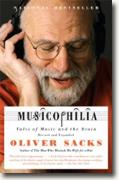Musicophilia
Oliver Sacks
book reviews:
· general fiction
· chick lit/romance
· sci-fi/fantasy
· graphic novels
· nonfiction
· audio books
· author interviews
· children's books @
curledupkids.com
· DVD reviews @
curledupdvd.com
newsletter
win books
buy online
links
home
for authors
& publishers
for reviewers

 |
Musicophilia: Tales of Music and the Brain, Revised and Expanded Edition Oliver Sacks Vintage Paperback 448 pages September 2008 |
|
Oliver Sacks has won a place on our bookshelves and our national compendium of psychological knowledge. Beginning with his popular treatise The Man Who Mistook His Wife for a Hat and the strange sad story of Awakenings, he has become a recognized and lauded spinner of clinical tales, tales of the weird, the wonderful, and the wacky – all true, all thought-provoking, all reminders that the brain is unpredictable and its content vast.
Here he concentrates on the many effects of music on consciousness. He draws from his wealth of correspondence and his own encounters with patients. He describes, for example, a visit to summer camp, but not the usual kind. This is a camp for people of all ages with Williams Syndrome, a complex of symptoms that include a high degree of sociability, some degree of mental retardation, a pixie-like face, and often an extraordinary love of and talent for music. Williams Syndrome folks will greet you with great happiness and have no fear of strangers. This very rare syndrome can give cognitive defects along with odd verbal capacities, such as a fascination with arcane, apparently useless words like "abrasive", "canine" and "solemn", which most children don't generally use. Gloria Lenhof is a Williams Syndrome woman who can sing operatic arias in three languages yet cannot add simple numbers or live without considerable supports. Music seems to "come to" people, often at times when not in the least expected. One man described in this book began to sing at the onset of Alzheimer's. He will break into a chorus of "Rudolf the Red-Nosed Reindeer" without being able to remember what a reindeer is. He spends much of his time singing with old folks, his musical talent an apparent compensation for the loss of other faculties as his personality gradually slips its moorings. Older people suffering nerve hearing loss may suddenly begin to hear snippets of music, often music they don't even like, music which is played through the brain in total surround sound, unable to be blocked out. These experiences can be either annoying or inspiring. The book opens with the story of a surgeon who had a near-death experience after being struck by lightning. Subsequently, he had a "sudden onset of craving for piano music." He started to hear this music in his head, became obsessed by it, acquired a piano, learned to play it to recreate the music he was hearing, and became convinced that "the only reason I had been allowed to survive was the music." Music seems to exist in a plane beyond our understanding, and it is notable that music heard in dreams is generally clear and accurate, unlike other perceptions. Music has great power, as evidenced by Sacks' account of an old woman with an apparently useless paralyzed leg, whose knee began to jump when she heard music of the kind she used to dance to as a youngster. By means of these tunes, her leg came back to life and she regained the ability to walk. Musicians whose hands curl up in a recalcitrant refusal to continue playing an instrument may develop a compensatory skill such as conducting or playing one-handed as the force of music in their lives continues to drive them. Dance therapy is useful for sufferers of Parkinson's Disease. Sometimes people with senile dementia or other mental deficits can sing as "presently" as they ever did, but Sacks is certain that, unfortunately, there is no way to carry this ability over into areas where the person is deficient. It is just what it is, a stray and singular talent. I once knew a man with a painfully pronounced stutter, and a lovely tenor voice. When he sang, he never stuttered. Perhaps he should write to Oliver Sacks. This is a Vintage edition of Musicophilia Originally published on Curled Up With A Good Book at www.curledup.com. © Barbara Bamberger Scott, 2008 |
| Also by Oliver Sacks: |
|
|
|
 Click here to learn more about this month's sponsor! |
|
| fiction · sf/f · comic books · nonfiction · audio newsletter · free book contest · buy books online review index · links · · authors & publishers reviewers |
|
| site by ELBO Computing Resources, Inc. | |
 One has the feeling that if someone knows someone who's really mentally messed up, Sacks will be contacted, not merely because he might be able to suggest a cure but in hopes of getting one's case mentioned in one of the good doctor's books.
One has the feeling that if someone knows someone who's really mentally messed up, Sacks will be contacted, not merely because he might be able to suggest a cure but in hopes of getting one's case mentioned in one of the good doctor's books.